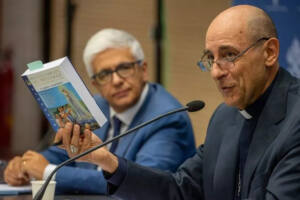
WelCom October 2024
In a highly anticipated report on the alleged decades-long apparitions of the Blessed Virgin Mary in Medjugorje, the Vatican’s doctrinal office has endorsed prudent devotion to Mary at the popular pilgrimage site in Bosnia and Herzegovina but has withheld any declaration on whether the alleged visions are supernatural in origin.
The Note from the Dicastery for the Doctrine of the Faith (DDF), approved by Pope Francis, grants a nihil obstat to the spiritual experience at Medjugorje. The authoritative judgment means pilgrims may continue to visit and pray at the site, as some 40 million people from around the world have done since the apparitions allegedly first began 43 years ago.
Six children, who are now middle-aged, first reported experiencing visions of the Blessed Mother, originally on a hilltop near the rural village of Medjugorje, on 24 June 1981. The Vatican’s report notes the remote site, formerly part of Yugoslavia, is now widely ‘perceived as a space of great peace, recollection, and a piety that is sincere, deep, and easily shared.’
While it offers no definitive judgement on the supernatural authenticity of the alleged apparitions, the Vatican’s report highlights the abundant good fruits that have come from Medjugorje.
‘The positive fruits are most evident in the promotion of a healthy practice of a life of faith, in accordance with the tradition of the Church,’ the report states.
It points to ‘abundant conversions, a frequent return to the sacraments – particularly, the Eucharist and reconciliation – many vocations to priestly, religious, and married life, a deepening of the life of faith, a more intense practice of prayer, many reconciliations between spouses, and the renewal of marriage and family life.’
Source: Catholic News Agency